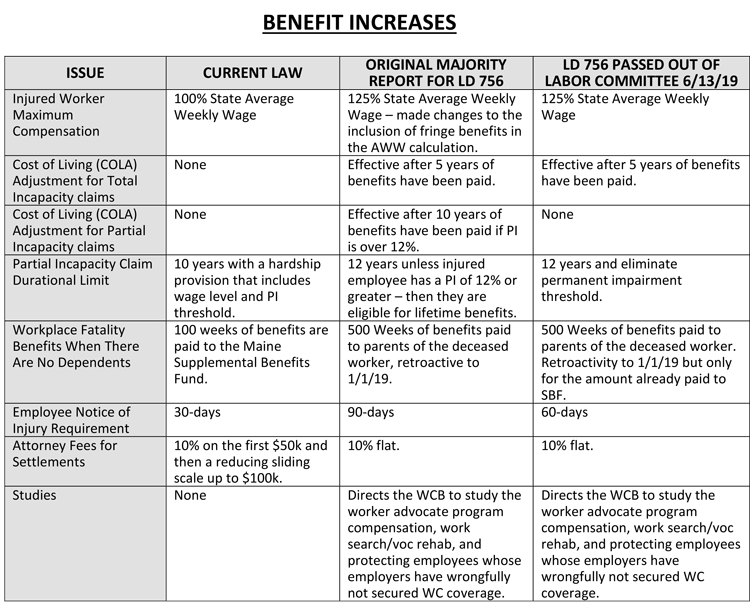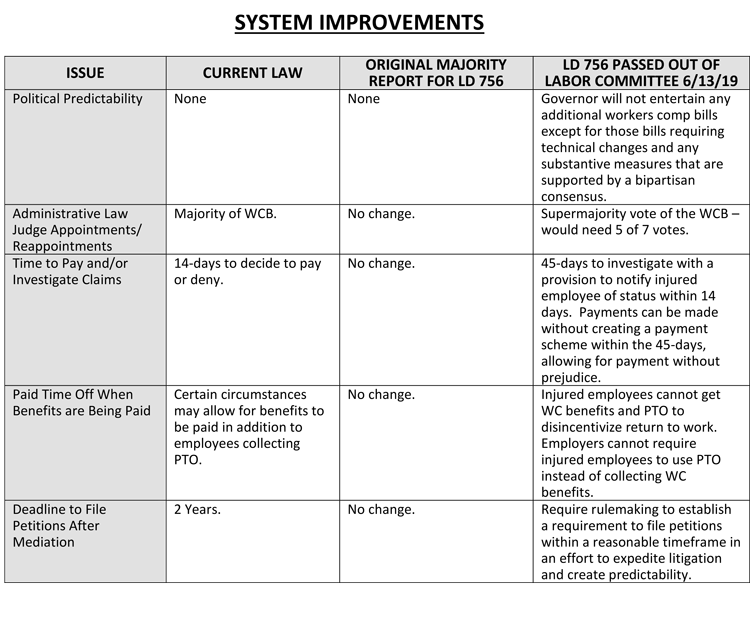(For a pdf version printed in the MMTA magazine, click here)
By the time this article is printed, the Legislature has gone home. The budget has passed, the studies are in the queue to be scheduled and the bills have either been signed, vetoed, or carried over to the next session that starts in January. But before we breathe a sigh of relief, we think the workers’ compensation policy debate that happened over the last six months deserves further discussion.
Going back to the beginning of this year, there were dozens of workers’ compensation bills introduced. These proposals ran the gamut from attorney fees (prevail), to extended benefits in different areas of the statute, to changing the standards for coverage and injuries. There was something that brought out every constituency – labor unions, trial attorneys, worker advocates, small businesses, large insurers and trade associations. The only problem? The system was not broken.
Throughout the hearings and work sessions, there was no objective evidence of any problem – only a few emotional stories of the system not accommodating certain individuals to the desired extent. This is not a very popular opinion to hold because there are real stories of real people with real injuries who experience real impacts by being in the workers’ compensation system. However, people who hold this belief are not heartless and are not devoid of sympathy for injured workers; quite the opposite, in fact. There is a certain segment of the business community that came together to assert the need for a system that covers the most amount of people for the greatest benefit levels possible for a price that the economy can afford. We had that system for almost 30-years prior to this legislative session, it was imperfect but it was acceptably balanced.
Democrats on the Labor & Housing Committee disagreed with our contention of acceptable balance. However, they listened and convened a stakeholder group meeting on May 10th to see what issues were most important for labor and for businesses. This meeting did not result in a compromise, only a re-litigation of the issues and why they were good/bad from different perspectives. Little did we know, there were negotiations that had already happened where a framework compromise had been developed by the State Chamber, MEMIC and labor interests. This framework compromise included benefit increases, albeit less than those the Democrats desired, but no system improvements were included. There were plenty in the business community that did not appreciate this approach – negotiating a less worse outcome – because it produced a floor for future negotiations that would include the political realities of the Democrat majorities.
To the Republicans credit, led by steadfast work by Senator Stacy Guerin, they held firm on the system’s need for balance and insisted that any effort to increase benefits needed to be offset with improvements to the system. When faced with a balanced approach or the Chamber/MEMIC compromise, the Democrats decided to play political hardball by passing an even more extensive benefits expansion because they could not get Republican support for the compromise. That’s when it became clear that they were looking to apply a political solution to a manufactured economic problem.
With the expected gnashing of teeth and wringing of hands, Governor Mills stepped in and invited a small but diverse group of legislators as well as business and labor interests to breakfast at the Blaine House, in an effort to calm tensions and attempt to find common ground. She made it apparent that she was not going to support throwing the system out of balance, but she recognized the pent up demand for expanding benefits. Her proactive leadership on this issue brought everyone together, even though significant policy divides remained.
Fast forward to early June and the issue was still festering. Democrats knew they had the votes to pass whatever they wanted, Republicans started using the very real threat of not voting for the budget with the distinct possibility of a state shutdown, and the Governor working to develop a compromise acceptable to both sides. There were tense moments, there were times when we thought there was a deal only to learn of a complication, and there were times when we thought a state shutdown was inevitable. In the end, calmer heads prevailed and a settlement was reached that had something for both sides to like and both sides to hate, but would not allow either side to claim victory – the very definition of a compromise.
Included in this article is a matrix of the issues. Where we are now, where we would have been if the original majority report was passed and where we ended up with the compromise for LD 756. We don’t yet know what the cost will be to the system because the National Council on Compensation Insurance (NCCI) had only priced up the original majority report at 4.2% to 6.3%. Using the same logic, we are guessing the resulting increase will be in the 2% to 4% range, but this will only be an estimate. The true costs will be driven by behavior and litigation changes, whether big or small.
Regardless of the number, this was the absolute best outcome that the business community could have hoped for given the context described in this article. There are many people to thank for their commitment to keeping the balance between disastrous economic impacts and expanding benefits. Chief among them are Senator Stacy Guerin, Representative Dick Bradstreet, Assistant Senate Minority Leader Jeff Timberlake and the Republican Caucus in both the House and the Senate. Credit should also go to Senator Shenna Bellows who, while she didn’t get everything she wanted in the bill, she approached the negotiations in a pragmatic way which allowed the compromise to happen. And finally, Governor Mills and her staff, who must have gotten significant pressure from labor interests and the trial attorneys, but consistently led the way to reach a conclusion that was good for Maine in the end.
Through it all, we appreciate the Governor’s stated commitment to not support substantive changes to the workers’ compensation system unless there is consensus from labor and management. At the end of the day, there is something to be said for consistency, predictability and stability.


